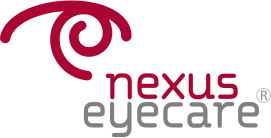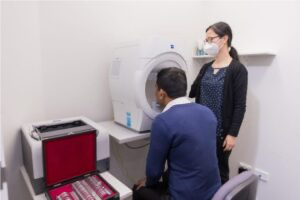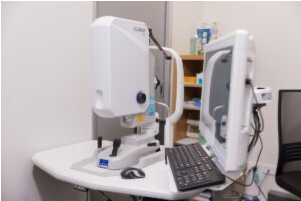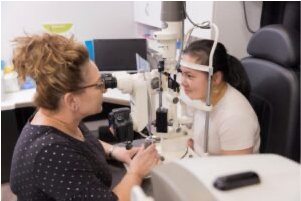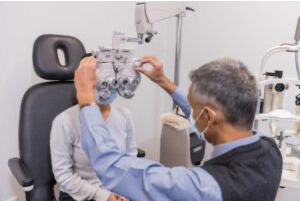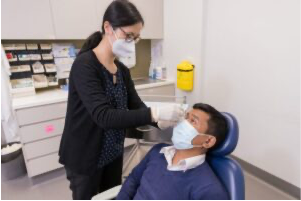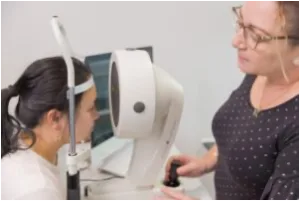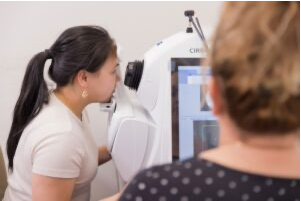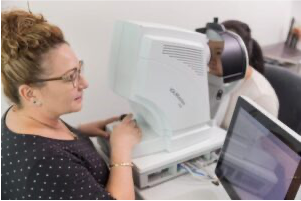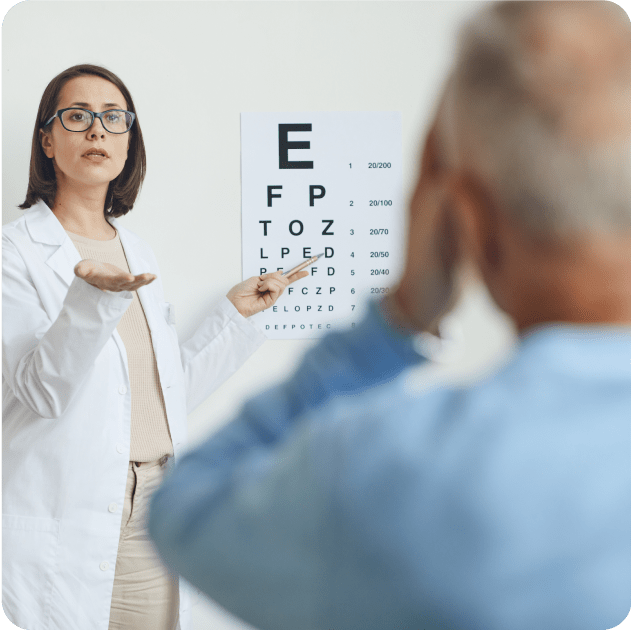
What is an Eye Health Examination?
An Eye Health Examination is a comprehensive evaluation of your eyes to assess both vision and overall eye health. It typically includes the following components:
Refraction: This determines whether you need glasses or any corrective lenses to achieve clear vision.
Examination of the front of the eye: The eyelids and cornea are inspected for any abnormalities, infections, or inflammation.
Lens evaluation: The presence of cataracts, which is a clouding of the lens, is assessed.
Examination of the back of the eye: The retina and optic disc are examined using specialised instruments to check for signs of conditions such as macular degeneration, diabetic retinopathy, or optic nerve abnormalities.
Assessment of other eye structures: The overall health of other parts of the eye, such as the iris and blood vessels, is examined to identify any potential issues.
An Eye Health Examination is highly recommended for individuals of all ages to ensure optimal eye health and detect any potential issues. Here are the reasons why regular medical eye tests are important:
Vision correction: A medical eye exam helps determine if you need glasses or contact lenses to correct any refractive errors, such as nearsightedness, farsightedness, or astigmatism. Ensuring clear vision is essential for daily activities and overall quality of life.
Early detection of eye conditions: Many eye conditions, such as glaucoma, cataracts, macular degeneration, and diabetic retinopathy, develop gradually and may not have noticeable symptoms in the early stages. Eye health examinations enable early detection, allowing for timely eye treatment and management of these conditions, which can help prevent vision loss.
Monitoring eye health: Routine medical eye tests provide an opportunity to assess the health of your eyes, including the front structures, lens, retina, and optic nerve. This helps identify any signs of abnormalities, infections, or diseases, even before noticeable symptoms arise.
Age-related eye health concerns: As we age, the risk of developing certain eye conditions increases. Regular eye health examinations become even more crucial for individuals above the age of 40 to closely monitor and manage age-related eye health concerns.
Vision assessment for driving licence renewal: After the age of 75, and for some chronic general health conditions, the RMS requires a vision assessment for the renewal of your driver’s licence.
By following the suggested intervals for eye health examinations based on age, individuals can proactively maintain good eye health, address any vision changes or concerns, and receive appropriate care to preserve their vision throughout life. Remember to consult with an eye care professional for personalised recommendations based on your specific needs and risk factors.
A thorough Eye Health Examination usually consists of several tests performed by your Ophthalmologist and their clinical team.
Initial standard tests include:
Medical history: A discussion about your general health, medications and any concerns you might have about your eyes
Visual acuity test: Measuring your ability to see clearly at different distances using an eye chart.
Refraction: Checking if you need glasses or contact lenses to see clearly.
Intraocular pressure measurement: Testing the pressure inside your eyes, which can help identify signs of glaucoma.
Pupil dilation: Your Ophthalmologist puts drops in your eyes to dilate your pupils. This allows for a better view of the inside of your eyes. Don't worry, the drops may temporarily make your vision blurry or increase sensitivity to light, but it's a safe and common procedure.
Slit lamp examination: The Slit Lamp is a special microscope that magnifies and illuminates eye structures. Your Ophthalmologist uses it to thoroughly examine your eyes.
After your initial eye assessment, depending on your results, you may require further specialised tests that focus on individual structures of the eye.
After your initial eye assessment, depending on your results, you may require further specialised tests that focus on individual structures of the eye.
Specialised tests include:
Visual field test: This medical eye test, also known as Perimetry, checks the extent and quality of your peripheral (side) vision. It helps diagnose and monitor eye conditions and neurological disorders that can affect the peripheral vision.
Optical Coherence Tomography (OCT): A non-invasive imaging scan that provides detailed cross-sectional images of the retina and optic nerve. It assesses the layers of the retina that cannot be seen on a slit lamp (microscope) examination. It is used to detect and monitor glaucoma, macula and retinal conditions.
Wide Angle Retinal Photography and Autofluorescence: A specialised camera that takes detailed images of your retina to detect and monitor any signs of glaucoma, macular or retinal conditions.
A-Scan Biometry: A non-invasive measurement of your eye used to calculate the most suitable intraocular lens power to ensure optimal vision correction after cataract surgery
Corneal Topography and Tomography: A painless diagnostic test used to evaluate overall corneal health, curvature and irregularities.
Lipiscan and Endothelial Cell Count: Non-invasive diagnostic tests used to thoroughly assess the surface of the eye and the health of the Meibomian glands in the eyelid for patients suffering from chronic dry eyes.
Orthoptic assessment: A specialised assessment for children with poor vision or eye turns, and adults with double vision and eye movement disorders
Throughout the examination, your Ophthalmologist and staff will explain each step and address any concerns you may have. After your assessment and tests are complete, your Ophthalmologist will sit with you and explain all your results and discuss if any treatment is required.
Regular Eye Health Examinations are important for early detection and proper management of eye conditions, ensuring good vision and overall eye well-being. Consult with your eye care professional for personalised care and guidance based on your specific needs.
After your Eye Health Examination, it is common for the eye drops used to dilate your pupils to cause sensitivity to light for a few hours. To ensure your comfort and safety, we recommend the following:
Wear sunglasses: Bring a pair of sunglasses with you to the eye health exam. They will help protect your eyes from bright light and reduce discomfort caused by sensitivity.
Arrange transportation: Since your eyes may be sensitive to light and your vision might be temporarily affected, it is advisable to have a friend or family member accompany you to the appointment and be prepared to drive you home.
It may not be possible to undertake work for the rest of the day after your examination. A medical certificate can be provided for sick or carers leave requirements.
By following these recommendations, you can minimise any discomfort and ensure a safe journey back home. If you have any concerns or questions after the eye health exam, don't hesitate to reach out to your eye care professional for guidance
Diagnostics at Nexus Eyecare
Experience an end-to end solution with specialised eye tests and medical expertise at our clinic.
Eye Health Examinations Video Gallery
Dry Eye Informational
Get an insight from Dr. Phillip Myers into the factors that affect dry eyes, and why eye drops are sometimes not enough.
